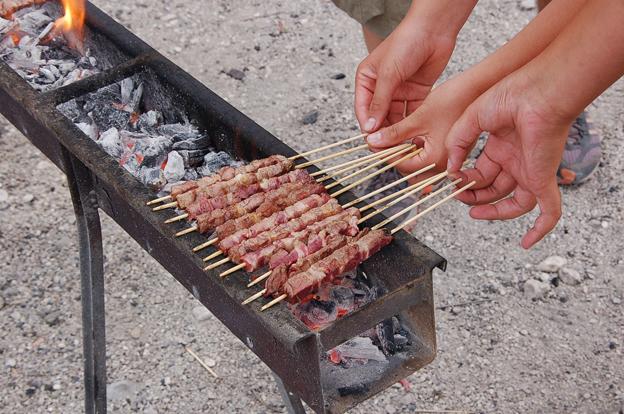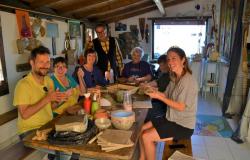The region of Abruzzo in central Italy has a varied cuisine, with many isolated villages still recreating ancient recipes that outside the community are still unheard of; however, two things synonymous with the whole region are maccheroni alla chitarra, square sided pasta that resembles guitar strings, and arrosticini.
Arrosticini are tender skewers of lamb cooked over an open fire, called arrustelle in the local dialect. Initially, the slender kebabs were made from the meat of castrated sheep, but nowadays they tend to be a mix of lamb and mutton.
It is thought that the skewer originated as a portable food for shepherds to cook outdoors and the small pieces of meat cooked quickly while remaining succulent. This tradition has resulted in the uniform cutting of the meat to ensure all skewers are the same length (10 cm) and width (1 cm).
Using all the meat from the animal from shoulder to leg and with occasional deposits of fat layered in-between, wooden skewers are driven through and then the arrosticini are cut with a very sharp knife giving them the well-known cubed look. Modern production now uses machines capable of making upwards of 500 at a time, but the uniformity and appearance remains true to the original creation.
These staples of the barbecue season are cooked over a specially designed charcoal burning brazier called a canale, meaning channel, resembling a narrow gutter where the meat is placed in line over the coals. It’s not rare to see locals cooking these with a modern portable hairdryer inserted in one end of the brazier to blow hot air down the channel so all the kebabs cook at the same time, a practice that I’d not recommend you try at home.
There’s no need to make a marinade for the arrosticini as the only addition to these tasty morsels is a little salt. Cooking time is short, being around 4 minutes with the skewers being turned once, and as the fat melts onto the coals, it fills the air with the irresistible aroma of seared lamb.
Simply served with slices of bread drizzled with an extra virgin olive oil, just pick up the skewer and, using the teeth, slide the hot cubes of meat into the mouth and enjoy a taste and tradition that has endured for over 200 years.









